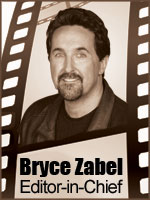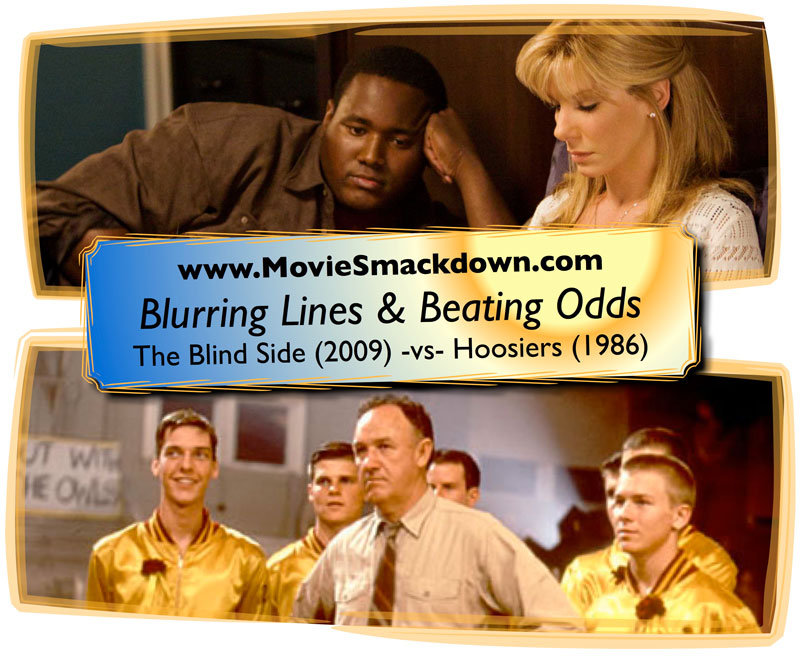 The Smackdown
The Smackdown
Both The Reader and Doubt feature lead characters that either are or probably are having sex with underage boys. If you’re looking to find the rooting value in either of these films, you’ll have to look pretty hard. During the awards season run-up out here in Hollywood both films got a big push from their studios as “serious” films worthy of Oscar attention and it got each a few nominations from other awards-giving groups (but not in the Slumdog Millionaire or Benjamin Button stratosphere). Now The Reader has made it into the Final Five in the “Best Picture” category of the Academy Awards but, even so, is clearly a long shot. One thing we can settle here and now, though, is which one is worth paying to see in a theater and which one you can wait for the DVD. That’s just how we roll at the Smack so let’s get started…
[singlepic id=700 w=320 h=240 float=right]
In This Corner
In director Stephen Daldry’s and screenwriter David Hare’s adaptation of Bernhard Schlink’s novel, The Reader, it’s 1958, Berlin, and a sad woman named Hanna (Kate Winslet) starts up a sexual relationship with a 15-year-old boy Michael Berg (German actor David Kross). The life experience head-start he gets comes with a price. She wants him to read to her. That’s right. She wants him to bring his school books and read out loud to her. At first the reading comes before the sex but, soon, the reading comes first, then the sex. About half-way through the film, things change a lot more than the sex/reading order, secrets are revealed and we are, basically, into an entirely different film that spans many decades into the future. And not joyfully different, mind you. Daldry and Hare are the same people who brought us the lost and depressing film, The Hours.
[singlepic id=661 w=320 h=240 float=right]
In That Corner
In case the title alone isn’t enough to tell you what’s at stake in this film, Doubt opens with a sermon by Father Flynn (Philip Seymour Hoffman) on the subject of… doubt. Father Flynn is the parish priest of St. Nicholas in the Bronx in this film written and directed by John Patrick Stanley, based on his own play. Right from the get-go, you see that Flynn has his hands full with the nun-from-Hell and school principal Sister Aloysius (Meryl Streep) who basically doesn’t like the change in the wind that Flynn represents. And, as fate would have it, change has just arrived at the school in 1964 in the form of a single African-American student Donald Miller (Joseph Foster II). Flynn has taken a special liking to the boy, helping him adjust, even appointing him an altar boy. But one day he summons the boy to the rectory alone and the boy comes back smelling like wine. The table’s been set for a clash between Father Flynn and Sister Aloysius.
The Scorecard
Both The Reader and Doubt ask you to feel a degree of sympathy toward the characters played by Kate Winslet and Philip Seymour Hoffman but, as a viewer, I never could muster any. This is not to say that the films are uninvolving but they are certainly unconventional in that regard. The truth is that Kate Winslet’s Hanna messes up her 15-year-old victim’s entire life by taking him into a sexual relationship and the fact that he’s a boy and she’s an older woman may be a fantasy for some people but in no way excuses it. Similarly, Hoffman’s Father Flynn, if guilty of having an improper relationship with a young boy, gets cut no slack because we now feel understanding toward our gay friends. An adult having sex with a teenager is pedophilia, at least by definition, and can’t be forgiven lightly, no matter what the circumstances.
There’s no question that The Reader has a more sweeping look to it. It’s full of the scope you’d expect from a film set in a foreign country over a period of decades. In contrast, Doubt is practically claustrophic in its confinement to the grounds at St. Nicholas. It started as a play and it’s been filmed as a play.
You can’t discount either Streep or Hoffman as actors, they’re always good, but they’re not the best they’ve ever been here. Kate Winslet, however, is a revelation in her film and she gets to play off a fresh face with no expectations in David Kross. Ralph Fiennes plays the older David in this film and he’s a disappointment. There’s no way the kid we see before us grew into this sad sack, no matter how challenging life got for him as a result of his experience.
The Decision
The doubt in Doubt is contrived and a cheap shot. Either Flynn did it or he didn’t and the film knows but won’t tell us. It’s a faux dilemma that I was unmoved by. So I didn’t admire the character if he did the deed and, if he didn’t, I wished he would have valiantly fought. Either way, this film left me cold. The film wants me to think that maybe, just maybe, Father Flynn is backing down because even the hint of an untrue scandal will tube his career in the Church but, in fact, the truth is more profund and disturbing. Assuming Flynn did it, the Church was as likely to promote him and cover up as we damn well know from the news itself.
On the other hand, The Reader is cold and distanced, and at the end of the day, seems to be saying that sometimes life just gets screwed up and there’s nothing to be done about it. It wants me to feel sorry for a woman who let hundreds of people die and seduced a kid but, hey, she can’t read and she’s sad. Sorry. Pass on that one, too.
Still, we need a winner and because of Kate Winslet’s fearless performance she provides the answer. If these two films are on your list this holiday, don’t check it twice, just go see The Reader.



I can’t disagree more. Doubt was gut-wrenching and I thought the performances were top-notch.
No offense and excuse my brashness, I’m over movies that take a little bit of underage May-December sex, add in a Father/Daughter line, and then throw in the Holocaust and what do you get? DRAMA!!
I don’t know. I enjoyed The Reader, it was interesting and it had some great moments, but Doubt was just overwhelming for me. The characters are far more driven and their goals are clearly defined–and when these two people go up against one another (these great actors) it’s a thrill and a pain to watch.
I didn’t think the film answered Flynn’s guilt. I took it as Flynn was a homosexual who was afraid of being outed, and had to bow to the Sister’s accusations in order to protect that secret–not some pedophiliac secret.
It is interesting to me to see how many people interpreted the homosexual insinuations as proof of him molesting the child–since it’s been shown over and over again that most molesters are heterosexual. And considering John Patrick Shanley’s history and biography as a playwright and director, it’d be a hard sell to say he was trying to put a correlation between homosexuality and pedophilia–it’s even hard to say that he would be oblivious to the insinuations and judgements he’d be making if he did intend for audiences to think Flynn did it while using blatant homosexual stereotypes (the flowers, the nails, the softness) to make that argument.
Doubt is a movie that really is an interactive experience. It’s about doubt and makes you doubt and leaves you there to find the message and the theme–it brings you close to the characters.
In The Reader, I could never really understand why the characters did what they did. Why did Ralph Fiennes not go to her defense and YET can still read to her via audiotapes–which is a both pathetic and weird–but goes largely unanswered. I understand that Winslet couldn’t read, got it–cute twist–but I can’t think of someone in their right mind who would go to jail for that long because they didn’t want to admit they couldn’t read–especially someone as feisty and independent as Winslet’s character was throughout most of the movie. Suddenly, she’s this hobbled mess…? I mean, I suppose I can rationalize my way to understand these things, but it seems that the director just didn’t want to answer them and instead was interested in making a very cold and sterile love-legal-Holocaust drama that splits the difference of all three and feels just as divided.
I’m sorry. I’m going to have to disagree here.
I felt The Reader was nice and engaging, if only in a exploitive way with the entire idea of the sex scenes.
However, Doubt got to me for the sole fact that I felt that there is more complexity underneath it all than people think. I do not think Father Flynn molested that boy. I felt that Father Flynn was a homosexual, closeted, who empathized with the young boy’s emerging homosexuality. Flynn’s fear was that of being exposed as a homosexual in the rabidly homophobic time period the film/play was set in.
Plus, to beg for certainty from a film that focuses on the human capacity to process, handle, and live with doubt… It just seems disingenuous.
This review makes me want to see THE READER. I disliked DOUBT and all of its traditional “beat around the bush” stereotypical Catholic Church tactics.
The Reader is a film that leaves a residue of moral duality stinging in our heads. Doubt is like a cliff notes version a epic moral dilemma. One can view it, take it in, and dismiss it.
The Reader is as complicated, unresolved and unsettling as true moral conflicts are. And it has an incomparable performance by Kate Winslet. Meryl Street need only to watch The Reader to be reminded of the impact she had as a young actress.
While all views are subjective when it comes to films, this film (The Reader) moved me in very unpredictable and disturbing ways. It got under my skin, stayed there like a festering wound, and forced me, as a viewer, to truly bring my own life and decisions along the way, to task.
No one ever really knows why anyone else does anything in a relationship much less an entire life. This film isolates those most traumatic moments and though Bryce dismisses it (his right as a viewer)…”sometimes life just gets screwed up”, I believe they happen more often than not in all our lives and our reactions have enormous consequences that most of us rarely see unless, among other things, we’re divorced or have been abused.
Hare and Daldrey put it all out there and allow Winslet to deliver the year’s best performance in refusing to let her judge her own life. That’s up to us. As it always is, lest we forget these last 8 years of American involvement in countries around the world. Perhaps, if Bush were a more avid “reader” we all would have been better off. And perhaps, so would Winlset’s character and all those whose live she so fatally impacted.
Just a thought…
Joe
Good point. Even if Flynn was guilty (and maybe especially if he was) the Church would have never held him accountable but promoted or transferred him. Don’t give your money to the makers of “Doubt.”